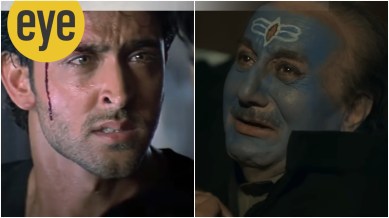Kashmir and Hindi cinema: A look into the changing lens
India’s evolving relationship with an ‘integral’ but problematic part of its geography viewed through the lens of popular Hindi cinema.

Hindi cinema’s fascination with Kashmir over the years has ranged from its preoccupation with its idyllic background to the conflict that has mired its history. Here are four films that describe India’s evolving relationship with one of its most problematic parts of its geography.
Kashmir Ki Kali (1964), dir. Shakti Samanta
monthly limit of free stories.
with an Express account.
The 1960s marked the beginning of Hindi cinema’s preoccupation with Kashmir’s beauty and as a site of pure romance. In Shakti Samanta’s Kashmir Ki Kali, the protagonist Rajiv, played by the effervescent Shammi Kapoor, escapes to Kashmir to avoid getting married, only to fall in love with Champa (Sharmila Tagore), a Kashmiri florist. Films from this period lacked direct references to the region’s bubbling political crisis, but anxiety over Kashmir’s ‘special status’ reared its head in subtle ways. While deconstructing their romance as a recurring trope, scholar Ananya Jahanara Kabir writes (South Asian Popular Culture 1.2, 2003), “The Kashmir landscape sometimes metamorphosed into the heroine, the paradigmatic Kashmir ki Kali (‘The Rosebud of Kashmir’, a popular Bombay film of the 1950s) deflowered, as it were, by the hero, himself always ‘unmarked Indian:’ North Indian and Hindu…”
Mission Kashmir (2000), dir. Vidhu Vinod Chopra
As tensions escalated in the Valley, 1990s Hindi cinema directly addressed the conflict in Kashmir, albeit, limited it to the question of religious fundamentalism, rather than the larger political question of Kashmir’s self-determination. However, a new protagonist emerged in the form of the misguided militant, centering his body as an object of desire. Mission Kashmir leaned the hardest into this trope, starring Hrithik Roshan right after his breakout success with Kaho Na… Pyaar Hai. Hrithik plays Altaf, a young Kashmiri Muslim who turns to militancy after his parents are accidentally killed by security forces in a crossfire. However, he switches sides after discovering himself at the centre of an international terrorist conspiracy against India. The film was a blockbuster hit that Suketu Mehta, who assisted Chopra on the screenplay, wrote in his book Maximum City (Vintage, 2004): “The militants claim Hrithik for their own, delighted that this most handsome star, the country’s most recognisable face, is playing one of their own, never mind the ending.”
Haider (2014), dir. Vishal Bharadwaj
Co-written by Kashmiri author Basharat Peer, Haider is perhaps Hindi cinema’s most sincere attempt to sympathise with the Kashmiri experience. Centred around the family of one of Kashmir’s many ‘disappeared people’, the narrative criticises the transgressions security forces make under the AFSPA (Army Forces Special Powers Act). Haider Meer (Shahid Kapoor) gradually loses his sanity as he realises that his own uncle Khurram (Kay Kay Menon), had a hand in his father’s disappearance. Conflict follows, and the valley’s snow-white terrain gets stained with streaks of crimson. Irrfan Khan delivered a memorable performance as the elusive ‘Roohdar,’ lending his nonchalance to the Valley’s morbid sense of humour, which is not lost on the film despite the gravity of its subject.
Kashmir Files (2022), dir. Vivek Agnihotri
Revered by the powers that be and dismissed by the medium’s foremost figures, Kashmir Files signifies the contemporary breakdown of communication between Kashmir and the mainstream. Released shortly after the abrogation of Article 370, critics argued that it was a strategically deployed piece of propaganda. In his book ‘Kashmir: Rage and Reason’ (Rupa, 2019), Kashmiri journalist Gowhar Geelani argues: “Perhaps a fundamental question is, whether there’s a political truth, beyond the Hindu-Muslim binary choice and beneath the multipolarity of conflicting and competing narratives… In between this sharply etched binary lies another perspective that sees human beings as human beings, not just as Kashmiri Muslims or Kashmiri Hindus.” Kashmir Files deliberately omits this ‘perspective’ and uses a broad ‘Hindu-Muslim’ brush to paint over a nuanced conflict. As Shubhra Gupta writes in her review for The Indian Express, “…this is not a film interested in nuance: it is a sledgehammer, especially in the way it stages its gory killings and lynchings, which make you shudder and shut your eyes.”